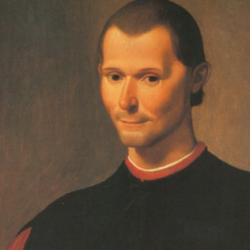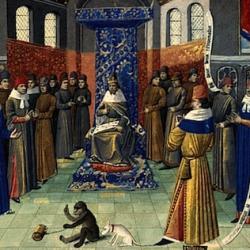David L. Schindler (Ordering Love) exposes the “instrumentalism” that functions as the public philosophy of what he describes as the “juridical state,” an instrumentalism that he does not hesitate to describe as “violent” insofar as it excludes, in the name of fairness, any “order of truth as given-in-itself” and “substantively reasonable arguments on its behalf” (106). The juridical state establishes what Ratzinger describes as a “dictatorship of relativism.”
It establishes a church of a certain kind, what Schindler describes as “positivist” churches that treat religion as a voluntary matter: “The juridical state . . . of its proper logic and in the name of non-establishment, implies ‘establishment’ not of this or that particular church, but of churches of a definite kind, and just so far unwittingly constitutes itself as a competent source in determining, for all public-political purposes, how God is first encountered by human beings, and indeed thereby also the nature of the God that is so encountered” (112).
Other churches, churches that are “churches” and not “sects,” are free of course to press their claims in the public square, but “only insofar as they, or for public-constitutional purposes behave like, positivist churches” (113). In short, “in order to be recognized publicly as reasonable, sacramental churches, with their naturally religious sense of man and the cosmos, will have to make their arguments in the same terms as positivist religious bodies.” They will able to present their sacramental arguments, but the order of the juridical state predetermines that these will be construed as “voluntary religious preferences that can as a matter of principle have only private-subjective moral inspiration, and not objective form, for public action” (119). Only voluntarist/positivist churches “will be truly free to take up public reason and interface with the constitutional order of the state in a way consistent with their own inner ecclesial self-understanding” (113).
Schindler calls the churches that have to accommodate to the implicit voluntarist establishment “sacramental” churches. These work on the assumption that things naturally, before they are taken into a “sacramental” system, “bear a constitutionally given order to God, and thus image God, from the moment of their creation. They bear a kind of ‘pre-sacramentality’: a ‘pre-sacramental’ sign and expression of God’s love which as such is open to, though it can never demand or even explicitly anticipate, the true and proper sacrament of God’s love revealed uniquely by Jesus Christ” (114).
Sacramental churches cannot accept Locke’s claim that church and state constitute two “perfect” or complete societies, each attending to one, but not the other, dimension of human existence. In Locke’s scheme, the state attends to temporal and public life, while the church to eternity and private belief; the state is oriented to earth, the church toward heaven. The church’s witness to the state may be necessary, but only insofar as it encourages public morality and so secures the temporal aims of the state. Locke’s paradigm instrumentalizes both heaven and earth: Earth becomes an instrument for the attainment of heavenly bliss, heavenly influence is reduced to an instrument for the maintenance of public morality (115-6).
From a sacramental perspective, this is simply false to reality. Heaven and earth, time and eternity, are not so related. They are not external to one another, and this extrinsicism “defines what is already the false autonomy that collapses [legitimate] secularity into secularism” (117). From a sacramental perspective, “no human act can be without an implicit religious meaning. No human act can be logically formless, hence neutral, with respect to God. Every human act, indeed every entity in the cosmos, rightly analogically understood in terms of its naturally given integrity, is in search of God and made for worship of God. Every human act bears in its depths a natural love for God, indeed for God above all. . . . every entity in the cosmos bears within it a call to holiness meant finally, via the agency of human beings, to take Eucharistic form, a form that precisely assumes and fulfills, rather than pre-empts and short-circuits, each entity’s integrity as natural and as human” (118).
This doesn’t deprive the natural of its integrity; it is rather to specify the character of that integrity: “The secular or the this-worldly, is naturally inclusive of the relation to God and the eternal. The earthly-temporal dimensions of life have their proper integrity as such, precisely as implicit signs and expressions of God and the eternal” (118).
This may seem to imply gloomy prospects for churches that reject voluntarist ecclesiologies, but it can be viewed otherwise. After all, many “positivist” churches want to resist the secularization of the liberal state. If they can be convinced that their voluntarism and anti-sacramentalism give aid and comfort to secularism, they might be encouraged to reconsider. That might itself take an instrumentalist turn: Churches place new emphasis on sacraments for the sake of resisting secularist tyranny. But it might also be the beginning of deeper reconsideration, a recognition that all things do indeed exist for the sake of an all-encompassing, cosmic Eucharist.















